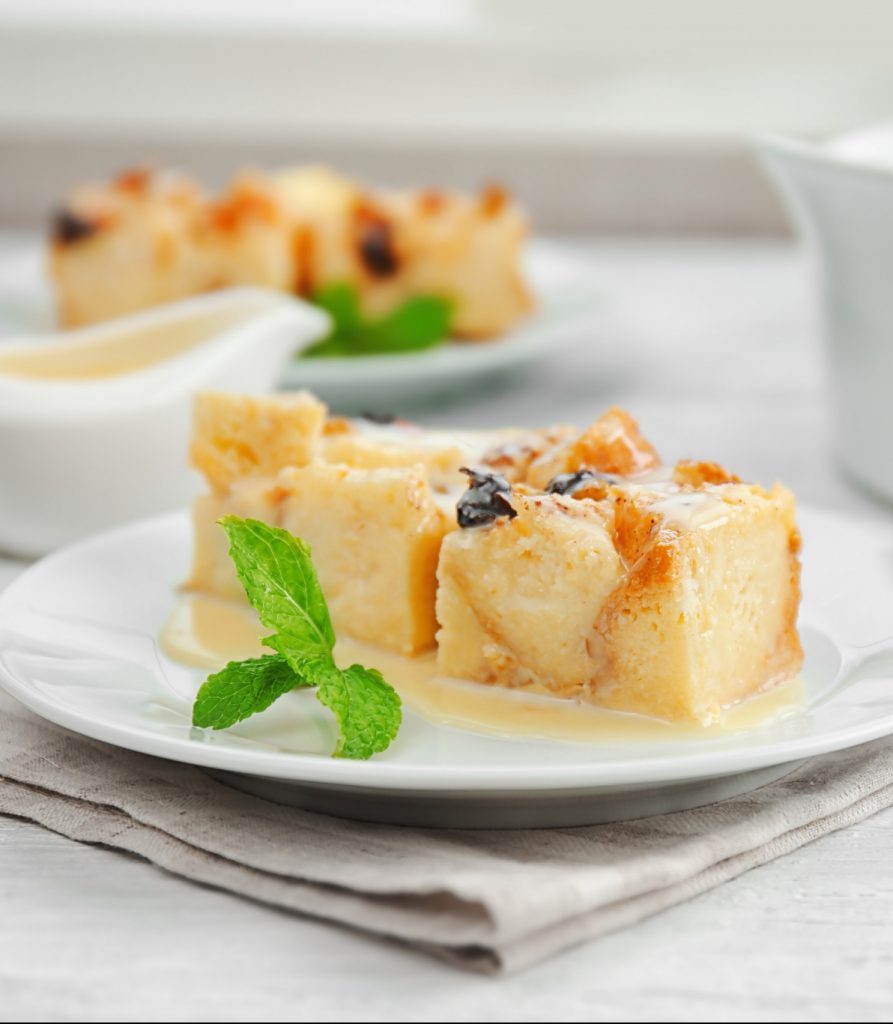This post is also available in: Español
Platanitos fritos or platanos maduros fritos as they are also known is probably one of the easiest Guatemlan recipes. This delicious Guatemalan dessert can be made in just minutes!
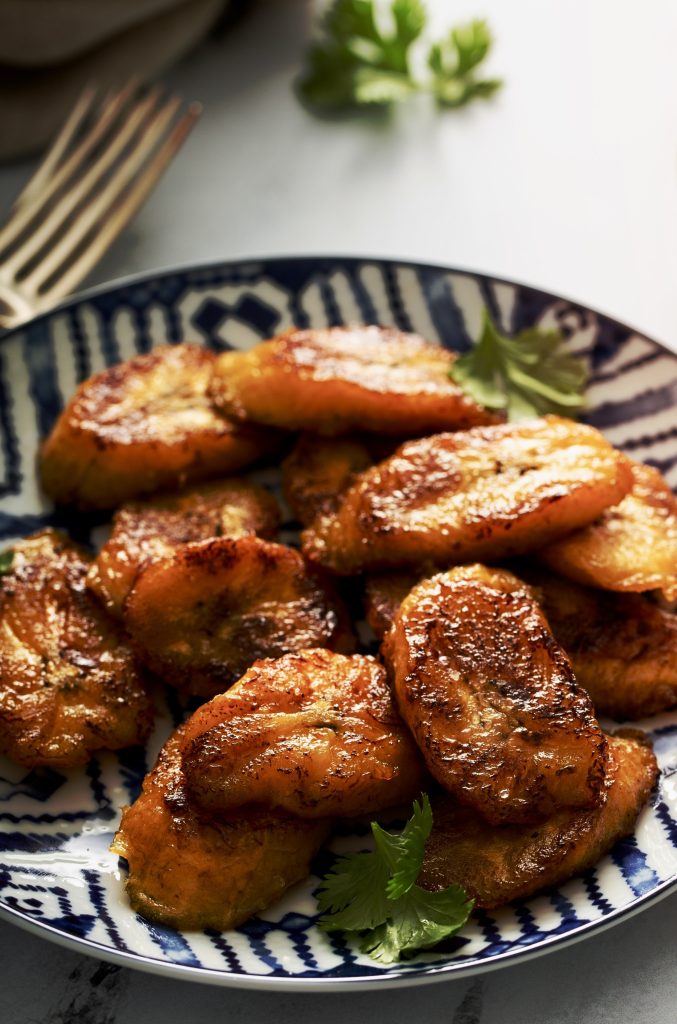
If you’ve ever had platanos fritos or grew up in Guatemala you may be wondering why you would even need a recipe to make these delicious fried sweet plantains. But if you’ve never made them, getting the platanos fritos just right does require a few little tricks.
What are platanitos fritos?
Platanos maduros fritos, also known as fried sweet plantains or platanitos fritos, is a traditional and popular dish in Guatemala. It is one of those things I always have hen I travel to Guatemala. But since this dish is s simple and is ready in minutes it is one that I make at home at least once a week.
Its sweet flavor of the plantains, combined with its ease of preparation, makes it one of my favorite Guatemalan foods. I always eat them whether I’m having huevos rancheros for breakfast in Antigua or as a side dish along with frijolitos when I order churrasco or carne adobada at Guatemala City restaurant.
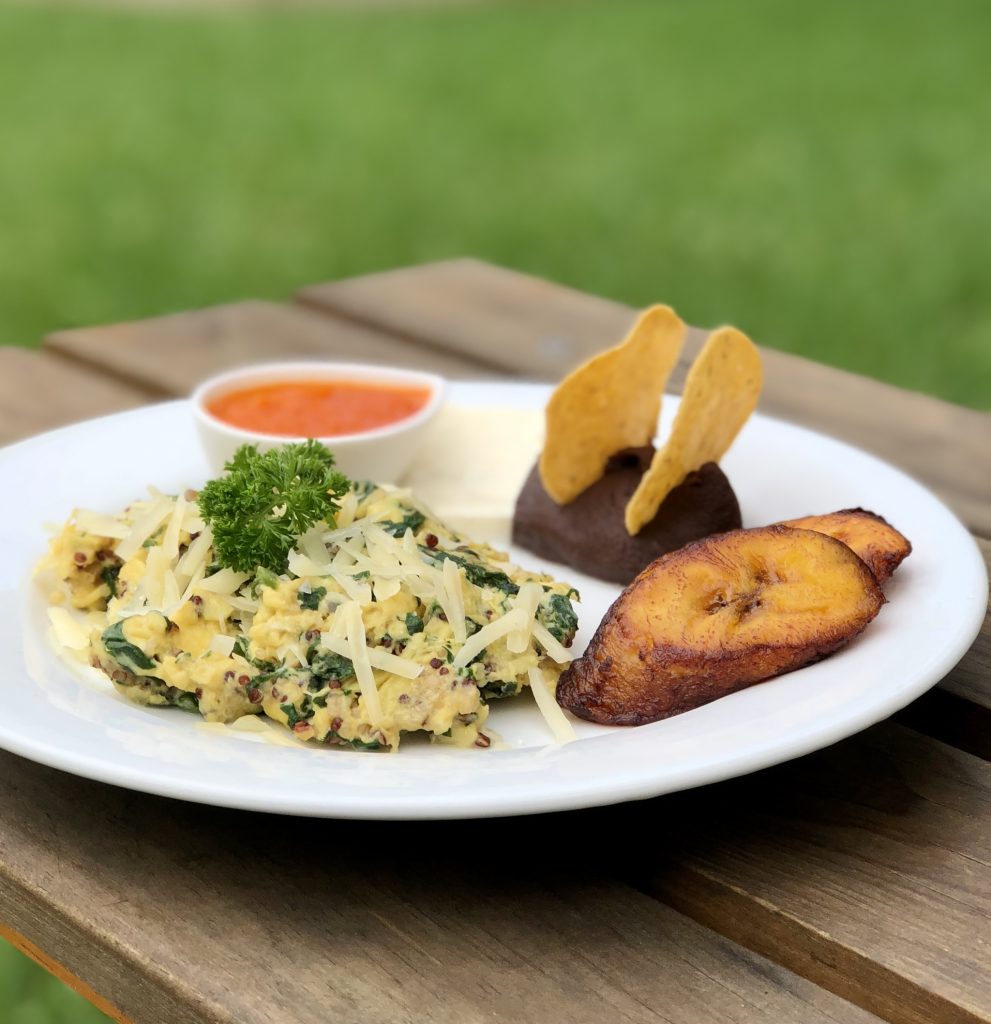
Platanitos fritos is not only a delicious dish, but it is also a dish that is steeped in tradition and culture. It is one of those dishes that is eaten all across the country from Atitlan and Antigua to Guatemala City and Quetzaltenango.
In Guatemala, platanos are used in many different dishes, including soups, stews, and main courses. They are a staple food in many Guatemalan households and are an important part of the country’s culinary heritage.
Different between plantains and bananas
Most people in the USA are familiar with bananas but are not used to eating or cooking plantains. So what is the difference between a plantain and a banana? They look pretty similar, but they’re actually quite different!
First off, bananas are sweeter and softer, with a yellow or even reddish skin when they’re ripe. Plantains, on the other hand, are starchy and much less sweet. They also have a thicker, green or yellow skin that turns black as they ripen. In fact, plantains are rarely eaten raw and are usually cooked before consuming.
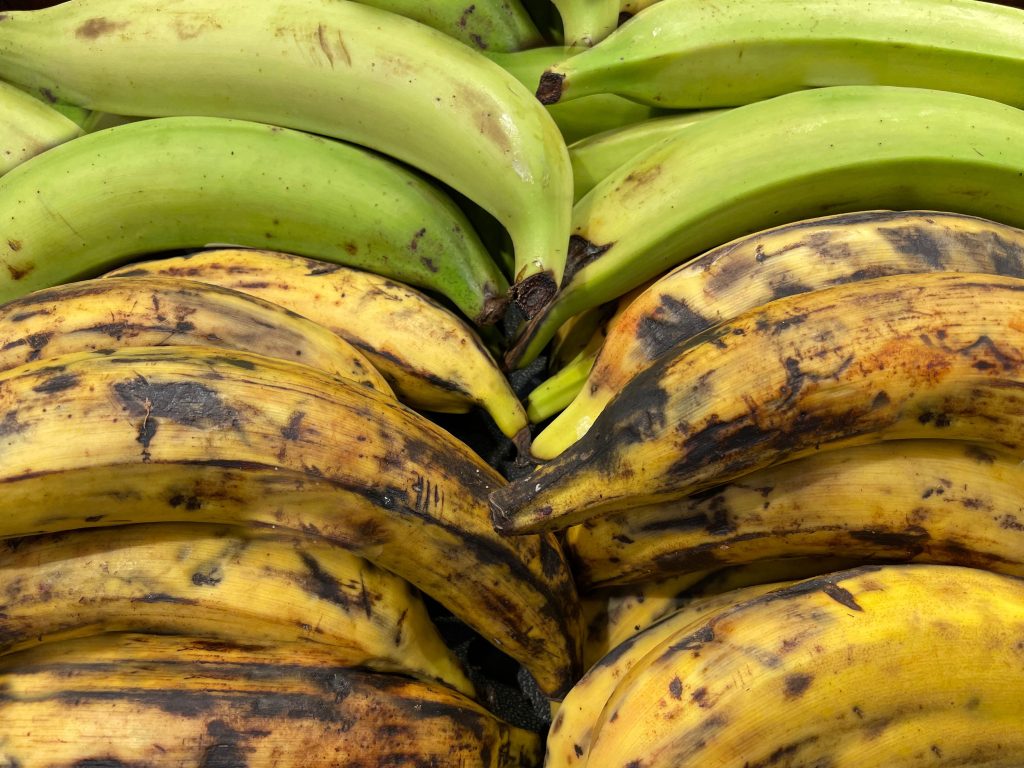
Another difference is in how they’re used in cooking. Bananas are typically eaten raw or used in desserts, smoothies, and other sweet dishes. Meanwhile, plantains are used more like a vegetable, and are often fried or boiled as a side dish or snack. They can also be mashed and used in savory dishes, such as stews and soups.
Finally, plantains tend to be larger and more elongated than bananas. They also have a firmer, denser texture, and are less juicy than bananas.
Where do plantains come from?
Plantains, the key ingredient in platanitos fritos, are a type of fruit that is native to Southeast Asia. They are similar to bananas but are larger, have thicker skin, and are less sweet. Plantains are widely used in many countries, including Guatemala, where they are a staple food in many households.
Plantains have been an important staple food in many cultures for centuries, and this is certainly true in Guatemala. Plantains are actually a member of the banana family, but they are larger and contain more starch. This makes them ideal for cooking and they are used in a wide variety of dishes.
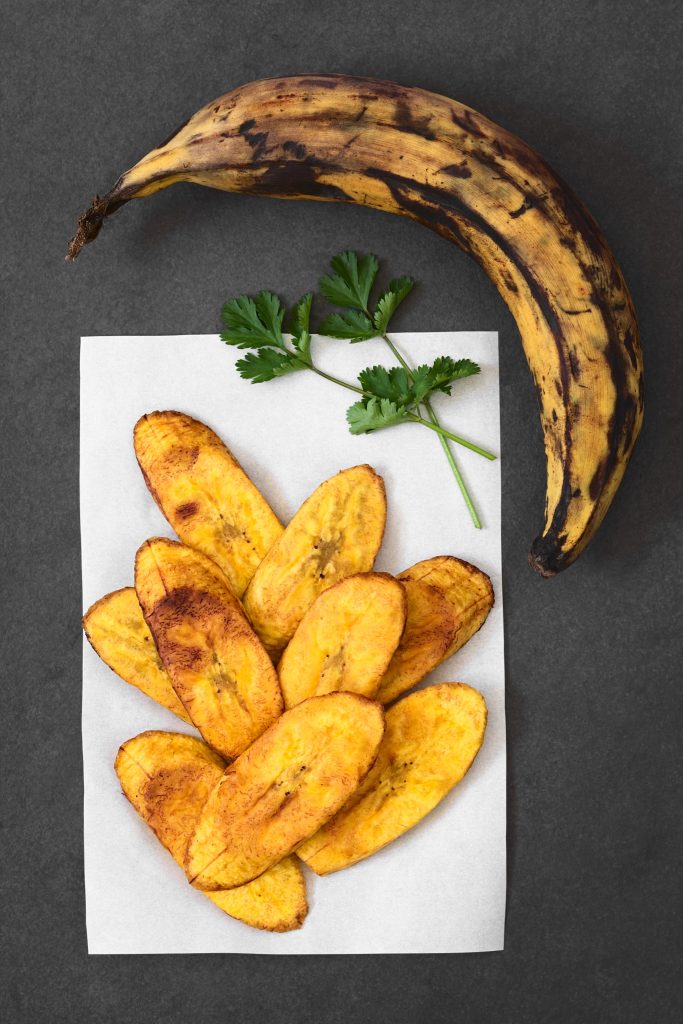
Plantains originated in Southeast Asia and were brought to the Americas by Spanish explorers in the 15th and 16th centuries. From there, they spread throughout the Caribbean and Central America, where they quickly became a popular food due to their versatility and long shelf life.
Overall, plantains have had a significant influence on Guatemalan cuisine and gastronomy. They are a versatile and delicious ingredient that has been incorporated into many traditional dishes, adding a unique and flavorful touch to the cuisine of this beautiful country.
Why Plantains are always a good idea
In addition to their versatility in the kitchen, plantains are also a nutritious ingredient. They are high in fiber, which is important for maintaining digestive health and can also help lower cholesterol levels. Plantains are also a good source of vitamins and minerals, including vitamin A, vitamin C, potassium, and magnesium. These nutrients are essential for overall health and can help boost the immune system, support healthy bones and muscles, and help regulate blood pressure.
Another benefit of using plantains in your cooking is that they are low in fat and calories, making them a healthy choice for those who are watching their weight. This means that you can enjoy the delicious flavor and texture of plantains without worrying about consuming too many calories or unhealthy fats.
How to make platanitos fritos
Platanos fritos is an easy recipe that requires just a few ingredients. To make this dish, ripe plantains are sliced diagonally and then fried in hot oil until they are golden brown. Once cooked, the plantains are sprinkled with sugar. There are many slight variations on how to fry ripe plantains, including the way they are sliced, the level of ripeness, and whether they are shallow-fried or deep-fried. Whether you prefer your plantains firmer or softer, or like me very ripe and fried until slightly caramelized on the outside chances are you either love platanitos already or are about to fall in love with them.
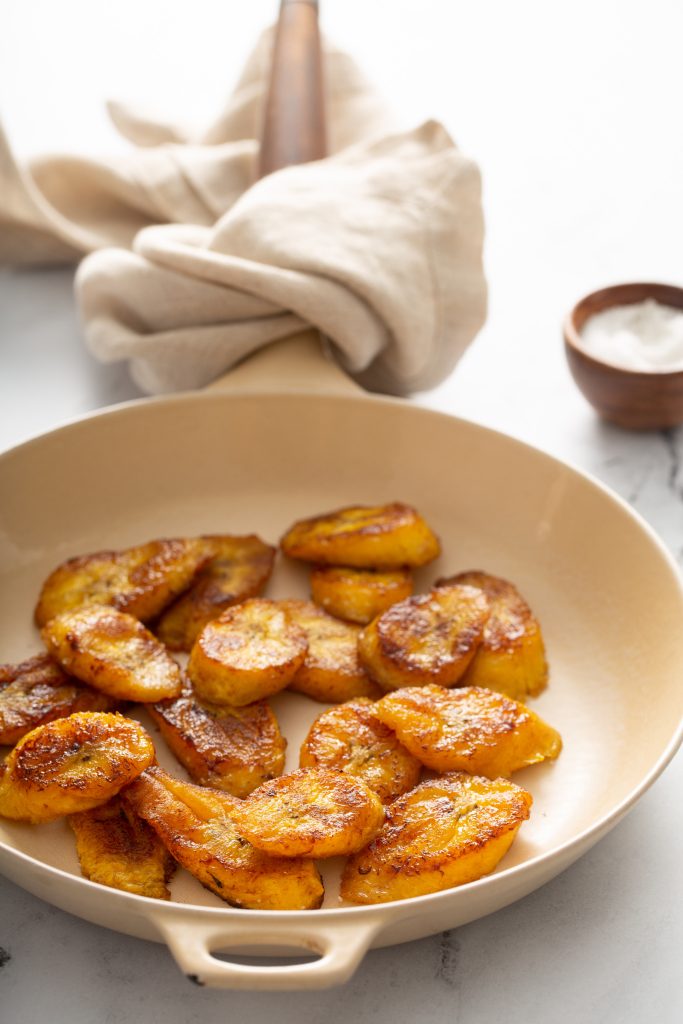
Aside from being popular in Guatemala, platanos maduros fritos is also a beloved dish in other Latin American countries, including Colombia, Cuba, Dominican Republic and Puerto Rico. In these countries, the dish is often served as a side dish for savory dishes such as rice and beans, or as a dessert.
How do you know a plantain is ripe?
So, you might be wondering, how do you know when a plantain is ripe and ready to eat? Well, a lot of folks out there think that a ripe plantain is actually a rotten one, but let me tell you, that’s when they’re at their sweetest! To get the best taste, you want your plantain to be mostly black with just a bit of yellow left, and still have some firmness when you give it a gentle squeeze, like when you’re checking a ripe peach. And hey, even completely black plantains are still good to eat, they’re just a bit too soft to work with easily, but boy are they delicious.
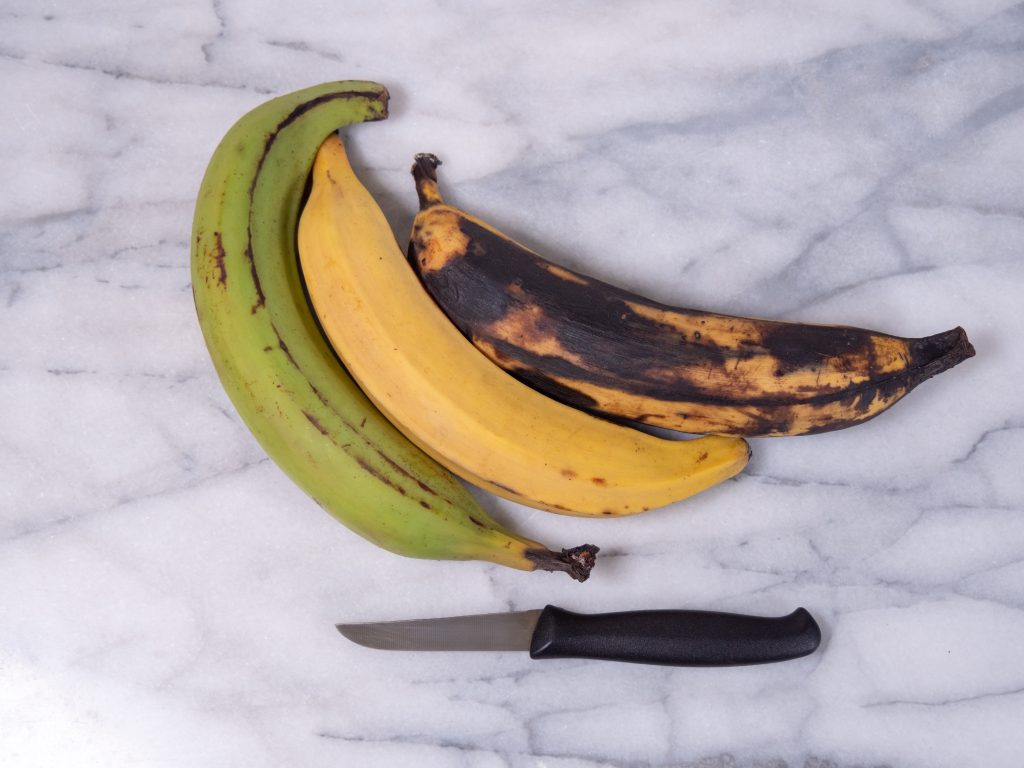
Now, it can be tough to find ripe plantains at your local grocery store. Usually, they’re sold green and need some time to ripen at home. Depending on the temperature and time of year, it could take anywhere from a few days to a whole week to get them just right. But if you’re looking for ripe plantains, I’d suggest checking out your local Latin or Asian market. They tend to have a better selection and will often have the riper ones available. So don’t be shy, go out there and get yourself some ripe plantains, you won’t regret it!
Recipe for making platanos fritos
I learned to make platanitos fritos at an early age. It’s one of those basic recipes that are so easy yet delicious. For me the key to making the best platanitos fritos is making sure that they are very ripe, because the riper the plantains are the sweeter. When frying them they should come out slightly caramelized on the outside and soft on the inside but still firm.
Ingredients
- 2 large very ripe plantains
- 1 cup of vegetable oil
- Sugar for sprinkling (optional)
Instructions
- In a pan, heat the oil over medium heat.
- Peel the ripe plantains and slice into slightly diagonal 1/2 inch rounds.
- Add them to the pan. Cook each side of the plantain until golden and slightly caramelized, for 2 to 3 minutes.
- Remove them from the oil onto a plate covered with a paper towel to remove excess oil.
- Serve hot sprinkled with sugar, or drizzled with crema and add sugar or serve without adding anything at all as a side dish or as an appetizer.
Tips for making the best platanos fritos
- Use plantains and not bananas: In Spain banana and plantain are used interchangeably as if they where the same fruit. This also happens sometimes in English. Make sure you are buying plantains and not bananas.
- Use ripe plantains: I cannot stress this enough. Plantains must be very ripe, almost black, to make the best platanitos fritos.
- Cut them diagonally: instead of cutting them into round slices, place the knife in a slight diagonal angle to the plantain so that the slices are slightly more elongated. This helps the plantain slices cook more uniformly and give the platanitos fritos their signature look.
- Cook them at medium low heat: don’t rush your platanitos. When frying them have some patience to give them time to caramelize on the outside and cook through without burning.
- Watch closely so they don’t burn. If the oil is too hot the plantains can burn quickly so keep an eye on them.
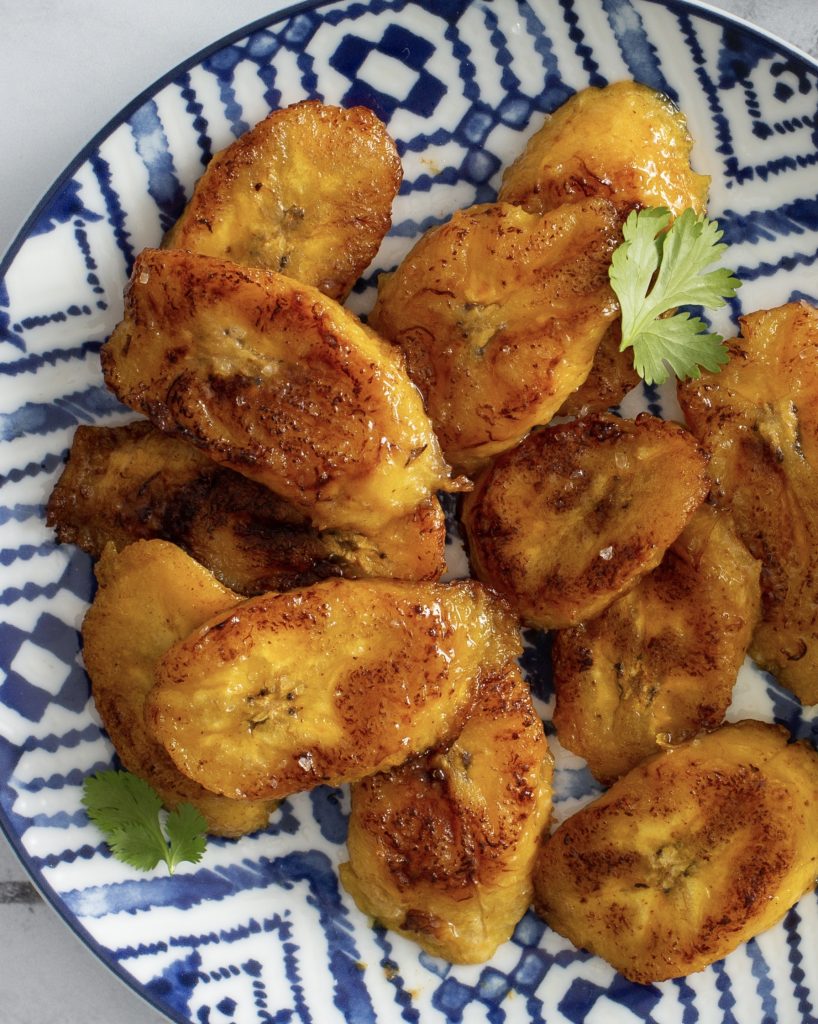
How to eat plátanos fritos
As I’ve mentioned before platanitos fritos are used as a side dish for many meals. They always accompany most breakfast dishes like huevos rancheros or any type of egg dish along with frijolitos (refried beans). They are also a great side for dishes like churrasco (steak) or chicken dishes along with rice.
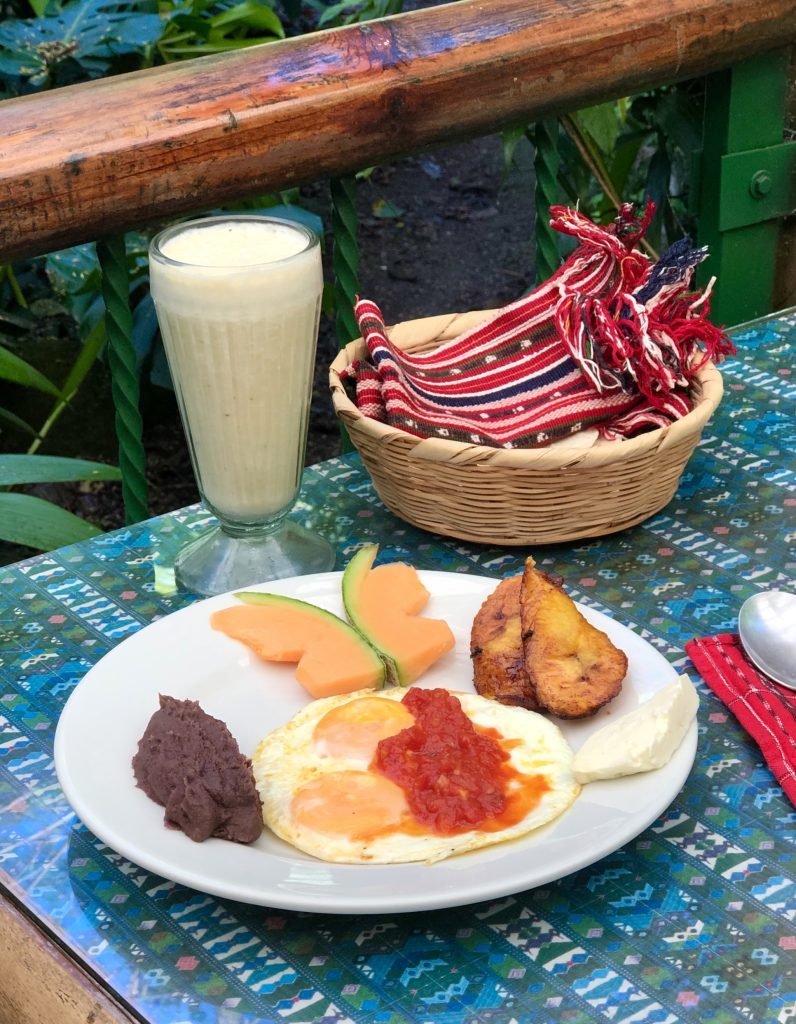
Platanitos fritos can also be eaten by themselves as a dessert or snack. I love to sprinkle some sugar or drizzle them with honey. But my favorite way to have them is drizzled with crema (Mexican cream will do) and sugar. Honestly, though, they are amazing just on their own.
Other traditional Guatemalan plantain dishes
Guatemalan cuisine is known for its use of plantains in various dishes. Plantains can be used in both sweet and savory dishes, and are often fried or baked. Guatemalan cuisine is rich with plantain dishes, and platanitos fritos is just the tip of the iceberg.
Rellenitos De Platano
One of the most beloved Guatemalan plantain dishes is Rellenitos de Platanos. Mashed plantain balls are stuffed with a sweet and savory mixture of black beans, sugar, and chocolate. The stuffed plantains are then fried until golden brown, creating a delicious contrast between the ssoft sweet filling and the slightly caramelized exterior.
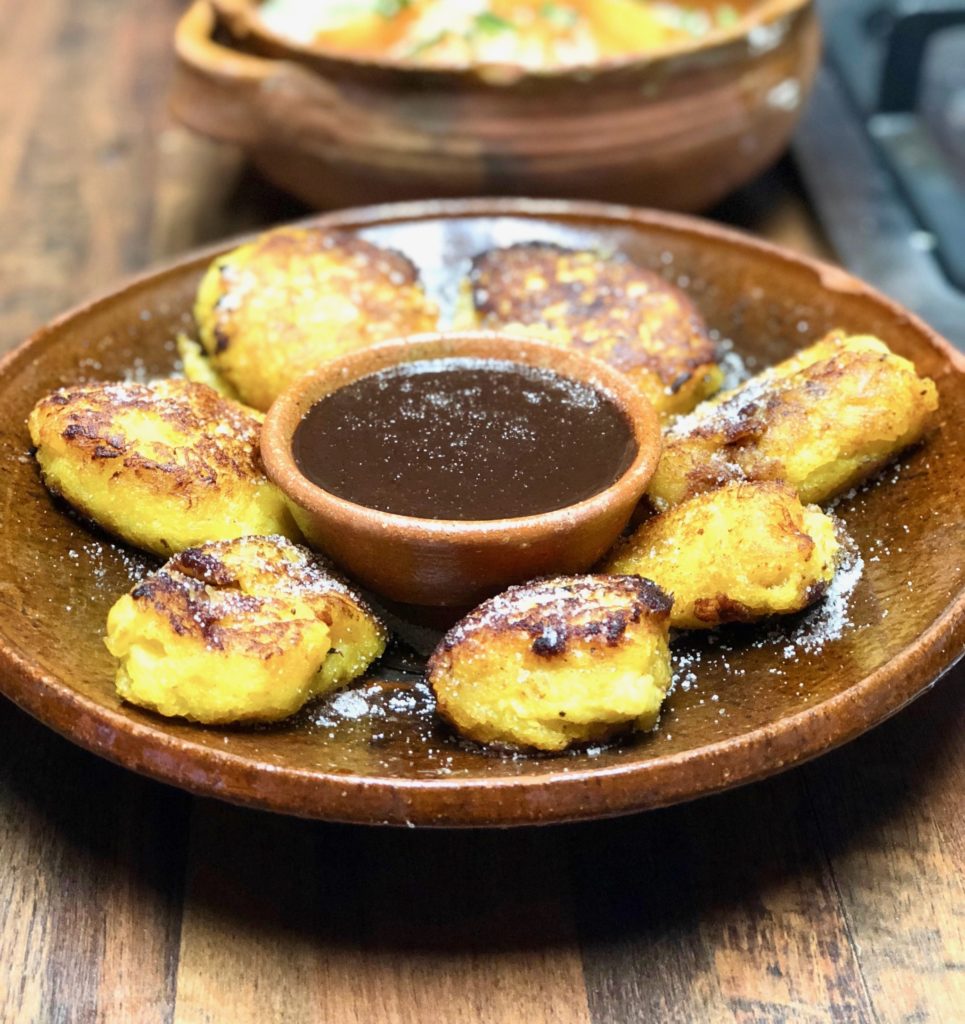
Platanos en Gloria
Another sweet plantain dish that is popular in Guatemala is platanos en gloria. Platanos en gloria is made by boiling ripe plantains in a mixture of butter,, sugar, and cinnamon until the mixture becomes a thick syrup. The dish is often served as a dessert and is a comforting and delicious way to end a meal.
Plátanos En Mole
Looking for a dessert that’s both sweet and savory? Look no further than Platano en Mole, a beloved Guatemalan food that’s sure to satisfy any craving! Featuring ripe plantains smothered in a rich, aromatic mole sauce, this dish is a true feast for the senses. Whether you’re a seasoned foodie or just looking to try something new, Platano en Mole is a must-try dessert that’s sure to leave a lasting impression!
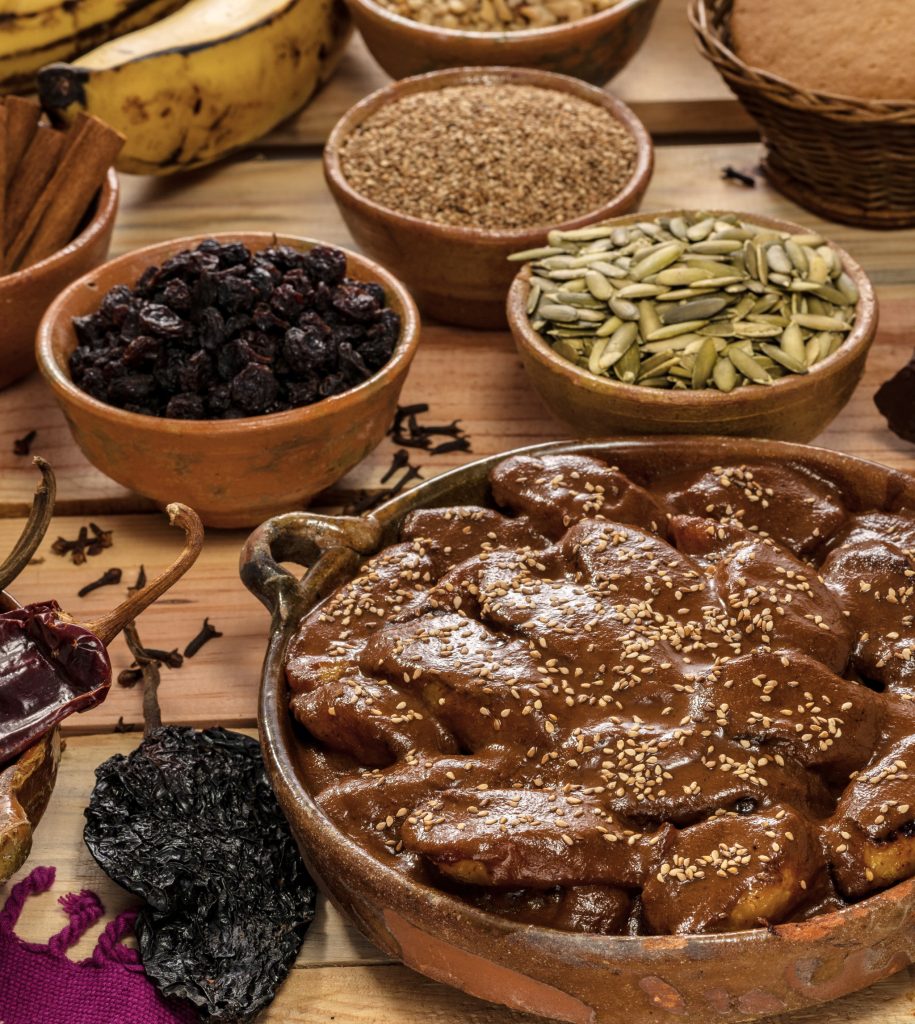
Tapado
On the savory side, Tapado is a traditional seafood soup that is often made with plantains. Tapado is a hearty and flavorful soup that features a mix of seafood, including fish, shrimp, and crab. The soup also includes a variety of fresh vegetables. Plantains are added to the soup to give it a sweet and slightly starchy flavor that balances out the seafood and vegetables.
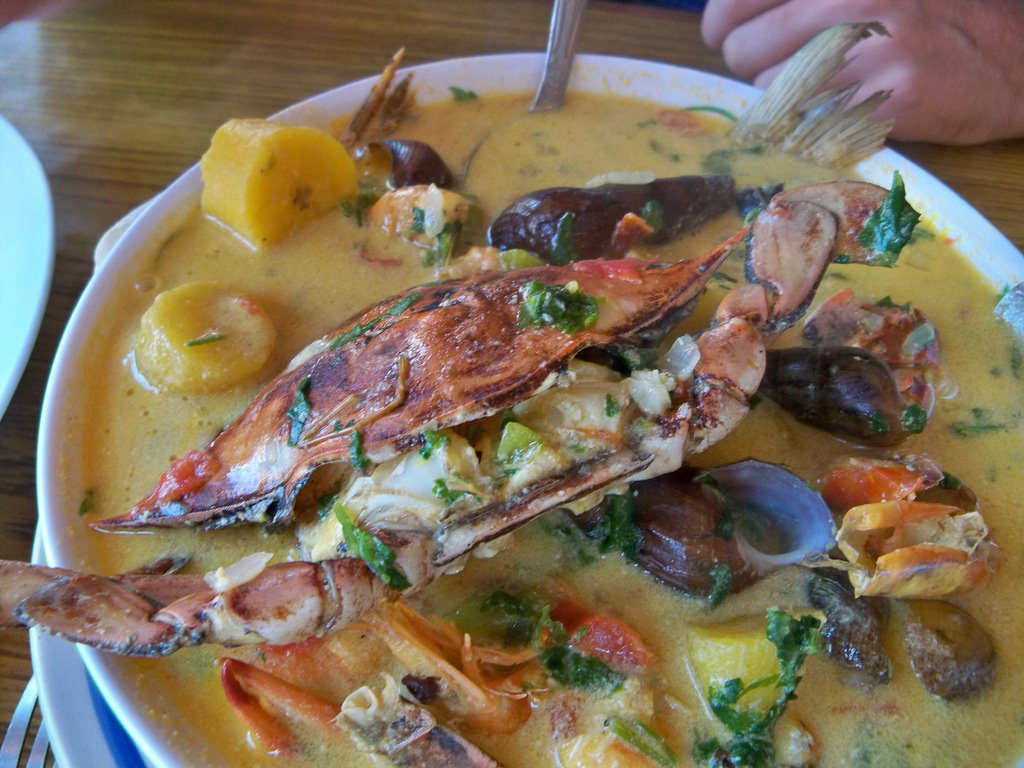
Plataninas
Finally, no discussion of Guatemalan plantain dishes would be complete without mentioning plantain chips known as plataninas. Plataninas are thin slices of plantain that are fried until crispy and golden brown. They are often served as a snack or as a side dish with sandwiches, soups, or stews. Plantain chips are a popular snack food in many Latin American countries and are often sold in stores and markets.
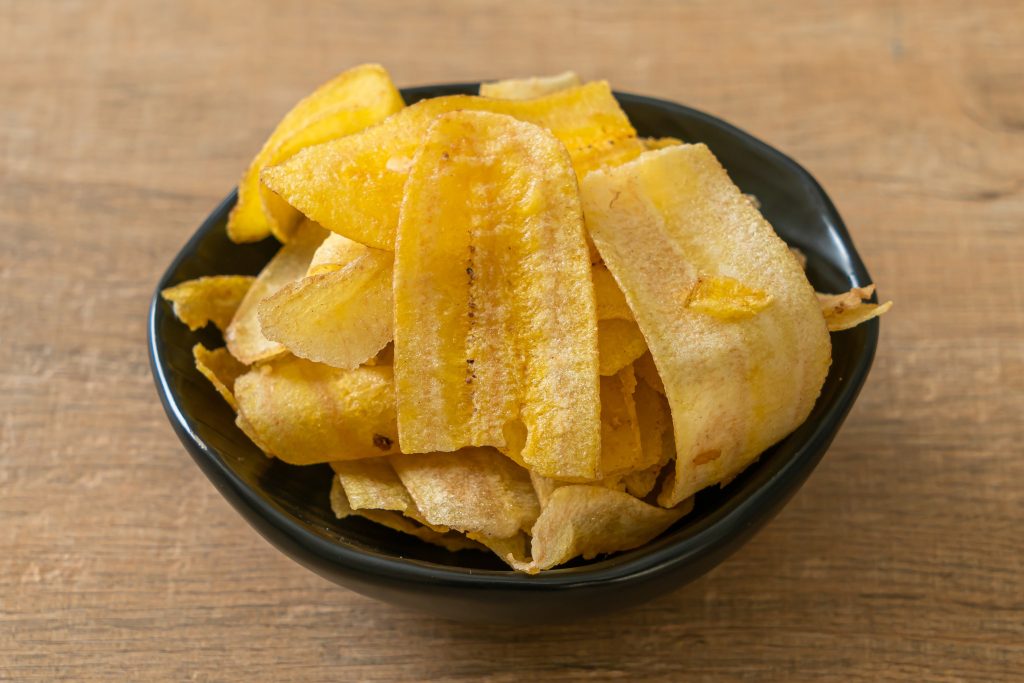
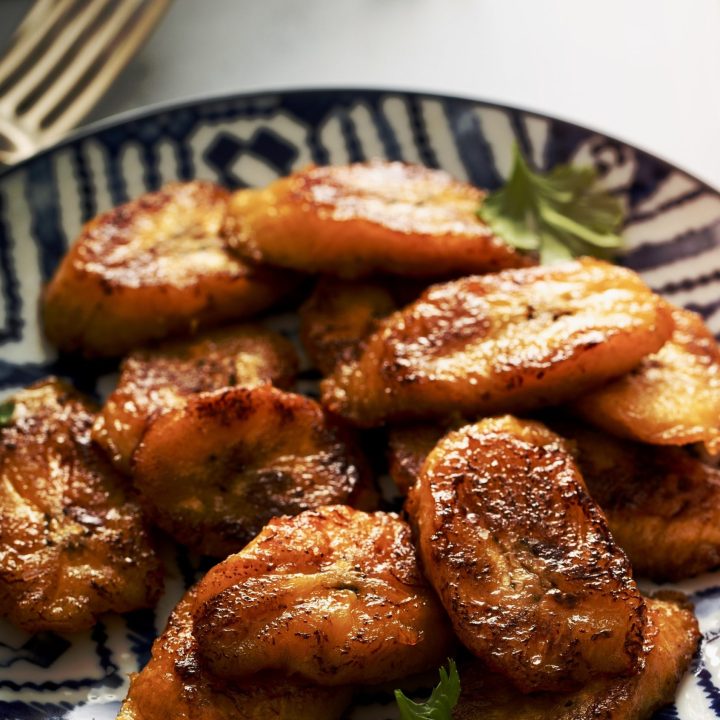
Guatemalan Platanitos Fritos: Platanos Maduros Fritos
Ingredients
- 2 large very ripe plantains
- 1 cup of vegetable oil
- Sugar for sprinkling (optional
Instructions
- In a pan, heat the oil over medium heat.
- Peel the ripe plantains and slice into slightly diagonal 1/2 inch rounds.
- Add them to the pan. Cook each side of the plantain until golden and slightly caramelized, for 2 to 3 minutes.
Remove them from the oil onto a plate covered with a paper towel to remove excess oil. - Serve hot sprinkled with sugar, or drizzled with crema and add sugar or serve without adding anything at all as a side dish or as an appetizer.
Notes
- Use plantains and not bananas. In Spain banana and plantain are used interchangeably as if they where the same fruit. This also happens sometimes in English. Make sure you are buying plantains and not bananas.
- Plantains must be very ripe, almost black, to make the best platanitos fritos.
- Cut slices diagonally. Place the knife in a slight diagonal angle to the plantain so that the slices are slightly more elongated. This helps the plantain slices cook more uniformly and give the platanitos fritos their signature look.
- Use medium low heat. Don't rush your platanitos. When frying them have some patience to give them time to caramelize on the outside and cook through without burning.
Nutrition Information:
Serving Size: 1 sliced plantainAmount Per Serving: Calories: 464Total Fat: 21gSaturated Fat: 2gCholesterol: 0mgSodium: 12mgCarbohydrates: 75gFiber: 6gSugar: 34gProtein: 2g
Other Guatemalan desserts
When it comes to traditional Guatemalan desserts there are so many options to choose from, you will have a tough time deciding which one to cook first! Here are some of my favorites but if you don’t find what you’re looking for here make sure to check my article for the best Guatemalan desserts where I include lots of other dessert recipes with everything from sweet tamalitos de cambray to traditional guatemalan candy like cocadas reales and even champurradas!
Arroz Con Leche Classic Recipe
In this yummy rice pudding recipe, you will taste the flavors of Guatemala melting in your mouth. It is an easy dessert you will surely be delighted to eat. Arroz con leche is the perfect Guatemalan dessert to make with the whole family on a rainy day. I hope you enjoy this quick and delicious typical Guatemalan recipe as much as I do.
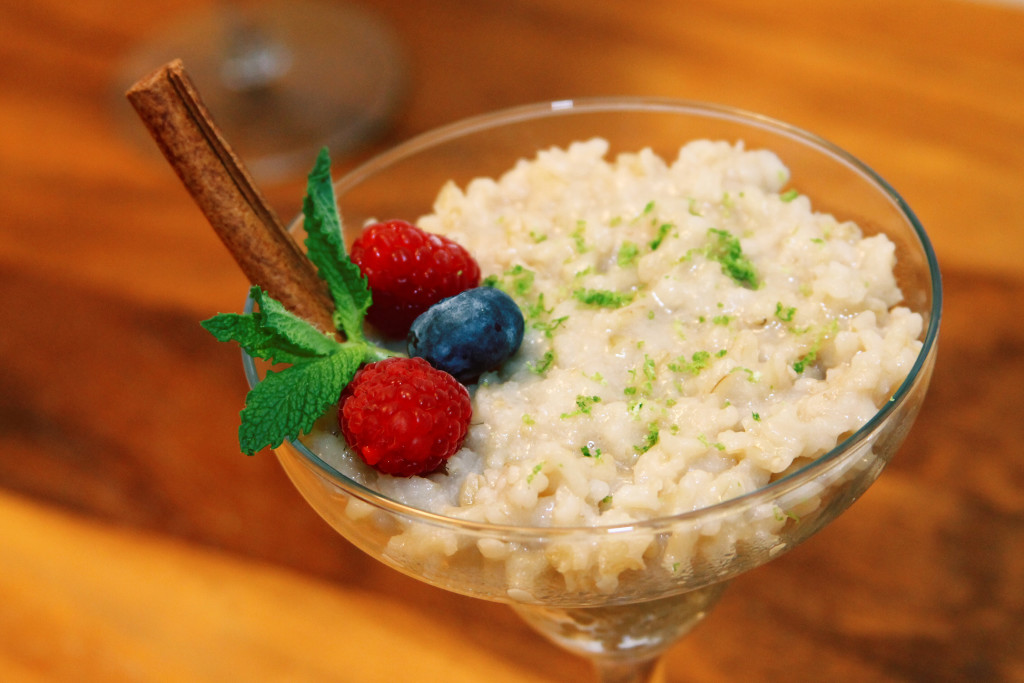
Buñuelos
Buñuelos are bits of fried wheat-based dough, crisp on the outside and soft on the inside. Throughout Latin America, there are different versions of buñuelos; they can be round, flat, or even twisted strips of dough. In Guatemala, the buñuelos are covered in powdered sugar and served in a light syrup with a hint of anise.
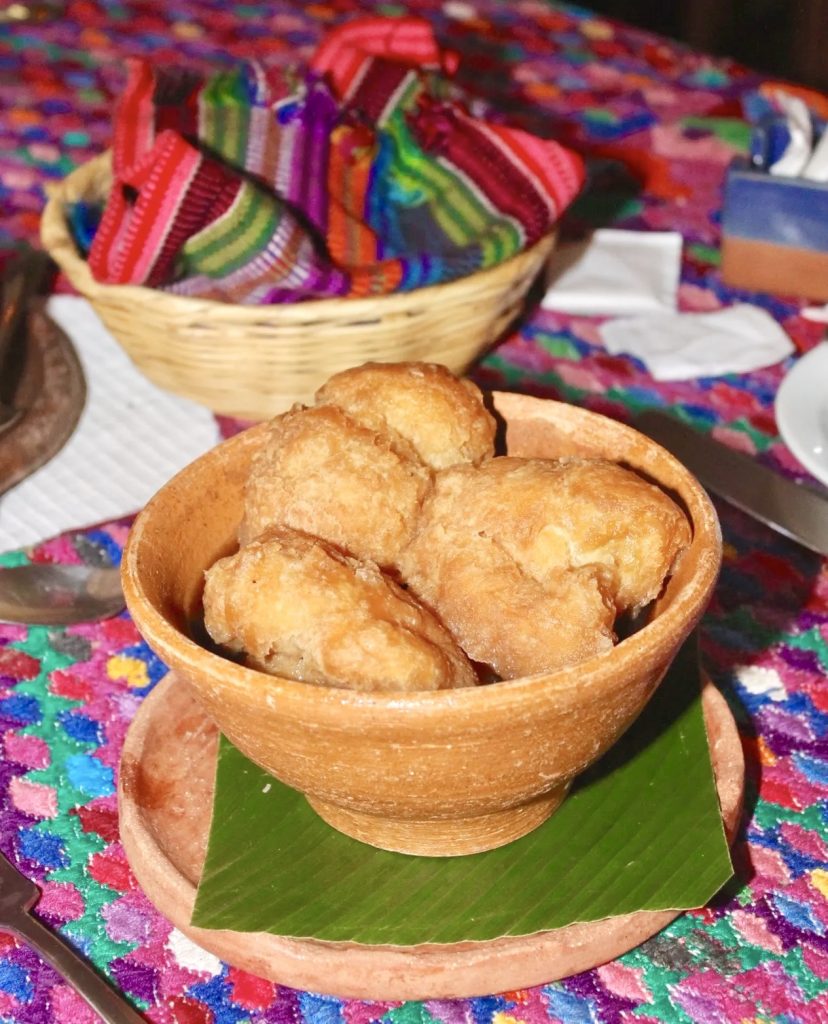
Empanadas De Manjar De Leche (Filled With Custard)
Empanadas de manjar are hand pie-like pastries filled with a milk-based creamy filling. If you want to surprise your loved ones with this delicious Guatemalan dessert, here is a quick recipe for you to prepare.
Bocado De Reina
Bocado de Reina is a delicious Guatemalan cake made with leftover bread. It is remarkably similar to bread pudding but has more of a cake consistency. It is an amazingly easy and quick dessert that goes great with any meal!
